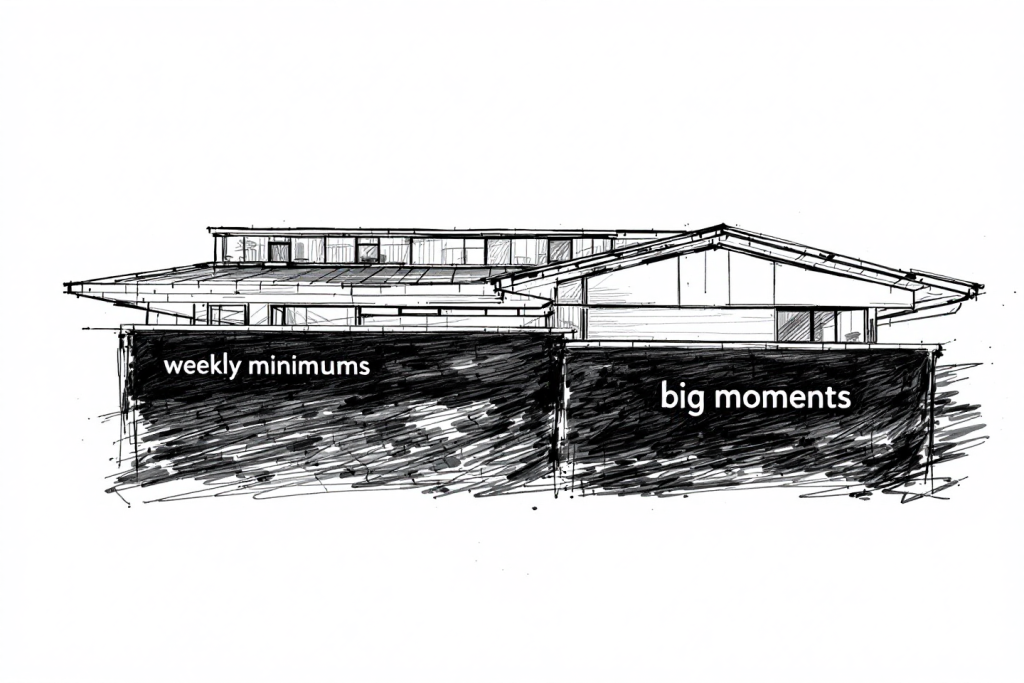Raise the Floor, Not Just the Ceiling: Minimums that Protect Marriage

 Big dreams are exciting; strong minimums are protective. Raise the Floor, Not Just the Ceiling is a simple shift: define non-negotiable practices that still happen on bad weeks—one date night, one check-in, one act of service—so your connection doesn’t live at the mercy of schedules, sniffles, or late deliveries. When you raise your floor, you stop riding the emotional rollercoaster of “great week = great marriage, tough week = distant marriage.” Instead, you get steady warmth that accumulates over time.
Big dreams are exciting; strong minimums are protective. Raise the Floor, Not Just the Ceiling is a simple shift: define non-negotiable practices that still happen on bad weeks—one date night, one check-in, one act of service—so your connection doesn’t live at the mercy of schedules, sniffles, or late deliveries. When you raise your floor, you stop riding the emotional rollercoaster of “great week = great marriage, tough week = distant marriage.” Instead, you get steady warmth that accumulates over time.
If you’ve ever relied on a single “special night” only to watch it evaporate, you already know why a higher floor matters. A monthly plan is fragile. A weekly rhythm is resilient. To see how redundancy multiplies your odds of connection, you can explore a trio framework in The Power of Redundancy: Why Three Touchpoints Beat One Grand Gesture. And for a dependable date rhythm that actually survives real life, the nuts and bolts live in Weekly Date Night Works Because Life Won’t.
Why “Raise the Floor, Not Just the Ceiling” Works
 Grand plans feel thrilling, but they fail the Tuesday test. The floor is the dependable close-to-effortless minimum you can keep even when this week is heavy. The ceiling is what you do when life cooperates. Without a floor, your connection collapses under minor turbulence. With a higher floor, you preserve warmth, trust, and safety—even when everything else runs late.
Grand plans feel thrilling, but they fail the Tuesday test. The floor is the dependable close-to-effortless minimum you can keep even when this week is heavy. The ceiling is what you do when life cooperates. Without a floor, your connection collapses under minor turbulence. With a higher floor, you preserve warmth, trust, and safety—even when everything else runs late.
Raising the floor doesn’t mean lowering your dreams; it means making your dreams deliverable. A high ceiling without a strong floor is a chandelier bolted to drywall; it looks good until gravity wins.
The Three Non-Negotiables That Raise Your Floor
 A raised floor rests on three lightweight, high-yield habits. They’re small by design so they survive headwinds.
A raised floor rests on three lightweight, high-yield habits. They’re small by design so they survive headwinds.
1) One Weekly Date (90 minutes).
Same day/time window each week, with two backups you actually enjoy (Saturday brunch; home picnic after bedtime). The point is dependable time that says, “Us, on purpose.”
2) One Weekly Check-In (10 minutes).
A short agenda—calendar, money, mood, gratitude, next steps—so surprises stay small and expectations align. This is your weekly cockpit. You can follow the simple agenda outlined in The Check-In Habit.
3) One Weekly Act of Service (plus daily micro-thank-you).
Choose one practical lift for your spouse (errand, chore, childcare block) that will noticeably lighten their load. Pair it with one specific “thank you” daily to warm the tone.
These three minimums already raise the floor. Add tiny reinforcements—5-minute micro-connections during the week—from the menu in Micro-Connections.
Set Minimums, Then Add Slack So Minimums Don’t Break
Minimums are easier to keep when there’s margin. Build a little slack around each commitment:
- Time buffer: Reserve a 2.5-hour block for a 90-minute date so traffic and lines don’t steal connection.
- Logistics buffer: Keep a home “date kit” (snacks, playlist, candle, blanket).
- Celebration buffer: Order gifts early; if they’re late, run a “reveal night”—a note + dessert + “promise date” on the calendar.
- Energy buffer: Take 10 minutes of solo quiet before your check-in or date so you arrive kind, not frayed.
Small margins make minimums feel natural. If you need a simple padding plan, see the practical ideas inside Weekly Date Night Works Because Life Won’t.
“Raise the Floor” Scripts You Can Use Tonight
Language lowers activation energy. Try:
- Date pivot: “I want to keep our time this week. If Friday’s tight, can we do Saturday brunch instead?”
- Check-in ask: “Ten minutes to line up the week—calendar, money, mood, gratitude, next steps?”
- Service offer: “What’s one thing I can take off your plate before Thursday—laundry, lunch prep, car drop-off?”
- Micro-thank-you: “When you handled bedtime solo, I felt looked after. Thank you.”
These scripts are how you raise the floor without drama.
A 30-Day Plan to Raise the Floor, Not Just the Ceiling
 Week 1: Choose the Minimums
Week 1: Choose the Minimums
- Put your weekly date on a recurring day/time and add two backups you enjoy.
- Schedule a 10-minute check-in (same slot weekly).
- Decide your weekly act of service (name it in the check-in).
Week 2: Add Slack
- Create a date kit at home and a shared list of favorite low-effort dates.
- Order one celebration essential early (card, small gift for the next birthday/anniversary).
- Add a 15-minute pre-connection buffer before your date/check-in.
Week 3: Micro-Connections & Energy
- Try two walk-and-talks (15–20 minutes).
- Institute two no-phone wind-downs this week (first 15 minutes phones in a bowl).
- Send a daily specific thank-you.
Week 4: Review & Adjust
- In the check-in, rate each minimum (1–5).
- Improve one element by one point (e.g., better babysitter plan, earlier reservation, simpler home-date).
- Celebrate with a short note to each other: “What helped most this month.”
By day 30, these minimums will feel like muscle memory—light to keep, costly to skip.
“Raise the Floor” in Hard Seasons (Travel, Illness, Holidays)
When turbulence increases, shrink but don’t skip:
- Date: A 20-minute dessert in a hotel lobby or at the kitchen island.
- Check-in: A 5-minute voice note exchange (calendar/money/mood/gratitude/next steps).
- Service: “I’ll take the morning school run for two days” or “I’ll manage meds and refills.”
Even mini versions keep the rhythm of care alive. That’s the point of Raise the Floor, Not Just the Ceiling—your minimums still land even when conditions are rough.
Minimums vs. Perfection: Avoid All-or-Nothing Traps
 Perfectionism is a floor destroyer. If your rule is “only a perfect date counts,” you’ll count too few. Trade “impressive” for “repeatable.” The couples who look effortlessly close aren’t fancier; they have dependable minimums that keep the soil warm. Then big moments land in soil that’s ready.
Perfectionism is a floor destroyer. If your rule is “only a perfect date counts,” you’ll count too few. Trade “impressive” for “repeatable.” The couples who look effortlessly close aren’t fancier; they have dependable minimums that keep the soil warm. Then big moments land in soil that’s ready.
Protect Your Minimums with Gentle Boundaries
Boundaries aren’t walls; they’re calendars. To raise your floor, guard the time you’ve already given each other:
- Decline politely: “We have a standing Friday commitment; could we join next time?”
- Nudge arrivals: “Let’s plan to be home by 8; we’ve got our check-in at 8:15.”
- Plan babysitting earlier: Book 30 minutes longer than you think you’ll need.
- Normalize Plan B: If the sitter cancels, the home picnic isn’t “lesser”—it’s equal and expected.
This tone—gentle, firm—keeps minimums intact without making them brittle.
What to Track (Because What You Measure Improves)
You don’t need a spreadsheet—just a few signals:
- Date attempts kept (out of 4). Aim for 3/4.
- Check-in streak. Count weeks in a row you kept the 10-minute meeting.
- Service completion. Did the weekly lift happen?
- Micro-thanks. How many days did you name a specific thank-you?
- Repair speed. Minutes from friction to a repair attempt.
If numbers dip, don’t blame each other; fix the design—add buffer, switch to simpler Plan Bs, or make the service task smaller.
Case Study A: The Cancel-Prone Couple
Before: One big monthly date; sitter often falls through; disappointment spirals.
After: A higher floor—weekly date with two backups; 10-minute check-in; one service task; nightly micro-thanks.
Result: Even “bad” weeks still include two connection wins. Tone warms, resentment fades.
Case Study B: The Roommate Rut
Before: Evenings dissolve into parallel scrolling; both feel unseen.
After: A raised floor with two no-phone wind-downs per week; 5-minute bedtime ritual; Sunday check-in; one act of service.
Result: Small consistency reduces defensiveness; natural affection returns.
If parallel scrolling keeps winning, the tiny fixes in Micro-Connections help you reclaim five minutes at a time.
Case Study C: Culture Clash Over “What Counts”
Before: One partner wants elaborate dates; the other prefers simple routines. Fights about “effort.”
After: Floor and ceiling language—“Let’s make our minimum simple and repeatable; we’ll plan one special night quarterly.”
Result: The minimums happen. Special nights feel fun again because they’re not tasked with saving the whole month.
Upgrade Path: After You Raise the Floor
Once your minimums feel steady, you can gently layer in “ceiling” moments again:
- Quarterly special date (tickets, overnight, workshop).
- Monthly theme (cooking night, bookstore date, local trail walk).
- Shared growth (read a chapter together, a class, a service project).
Ceilings are where you play. Floors are how you stay. Keep the sequence right and you’ll feel the difference.
Sticky Spots and How to Smooth Them
- “We missed our date.”
Don’t treat it like failure—treat it like weather. Shift to your backup. Keep the promise by changing the plan. If this keeps happening, you’ll find mindset help in the route-ownership tools here: Stop Blaming the Weather: Owning Your Route Through Resistance.
- “We argued during the check-in.”
Shrink it to five minutes and start with gratitude. Add a 10-minute solo reset before you meet. If emotions are hot, do a voice-note check-in while walking separately.
- “The service task gets forgotten.”
Make it smaller and name it early in the week. “I’ll take Wednesday lunches” beats “I’ll help more.”
- “This feels unromantic.”
What’s unromantic is disappointment. Minimums protect delight; they don’t replace it.
Gentle Add-Ons That Strengthen the Floor
- Two-question text at 3 PM: “How’s your energy? What would help tonight?”
- Bedtime blessing: One sentence—“God, thank you for my spouse; help us rest well.”
- Gratitude photo: Snap one pic weekly of your spouse doing something ordinary you appreciate; share it with a thank-you note.
These are tiny and optional—but they weave a strong net under your week.
If Your Spouse Isn’t Ready—Lead Softly
You can raise some of the floor alone and let the results invite your spouse:
- Put the check-in on the calendar and keep it to ten minutes.
- Prepare a home date kit and suggest a 20-minute dessert tonight.
- Do one act of service quietly and name your “thank you” daily.
Most partners respond to warmth plus reliability. You don’t need a speech; you need a pattern.
The Long View: Safety First, Spark Next
 When your floor rises, safety grows. Safety makes room for curiosity, playfulness, and desire. You’ll notice fewer “repair marathons,” more laughter, and a sense that you’re on the same team. Then the ceiling moments—the weekend trip, the surprise reservation—start to feel like dessert again, not medicine. That’s the quiet power of Raise the Floor, Not Just the Ceiling: it turns love from a lottery into a rhythm.
When your floor rises, safety grows. Safety makes room for curiosity, playfulness, and desire. You’ll notice fewer “repair marathons,” more laughter, and a sense that you’re on the same team. Then the ceiling moments—the weekend trip, the surprise reservation—start to feel like dessert again, not medicine. That’s the quiet power of Raise the Floor, Not Just the Ceiling: it turns love from a lottery into a rhythm.
Soft next steps if you want to keep momentum: build a three-touchpoint rhythm with The Power of Redundancy, and make your date system sturdy with Weekly Date Night Works Because Life Won’t.


